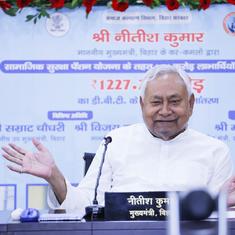Tamil Nadu approaches SC against Madras High Court stay on vice chancellor appointment laws
The High Court order on May 21 had stayed the operation of nine Acts related to higher education.

The Tamil Nadu government on Tuesday moved the Supreme Court challenging a Madras High Court order that stayed nine Acts related to the appointment of vice-chancellors in state-run universities, The Hindu reported.
On May 21, the High Court ordered a stay on the Acts despite an April 8 verdict in the Supreme Court that declared that the bills would be deemed to have received the governor’s assent from the date they were passed a second time by the legislature.
Most of the bills are related to higher education, including measures to remove the governor as chancellor of state universities.
The state government had notified the Acts after the April 8 verdict.
However, a public interest litigation petition was filed in the Madras High Court on May 12 against the constitutional validity of the Acts, according to The Hindu. On May 21, the High Court stayed the Acts on the ground that the 2018 University Grants Commission Regulations would prevail over state legislation by virtue of the doctrine of repugnancy.
The doctrine of repugnancy in Article 254 of the Constitution says that if a state law is inconsistent with a central law or an existing law, the central law prevails, and the state law is void to the extent of the conflict.
In its petition filed in the Supreme Court on Tuesday, the Tamil Nadu government said that there was a strong presumption of constitutionality against the laws passed by the legislature, The Hindu reported.
“Courts should be slow in passing interim orders in matters challenging constitutionality of provisions and against the strong presumption of constitutionality,” the petition said. “The High Court passed an interim order directing stay of operation of provisions which take away power of appointment of vice chancellor from the hands of the chancellor and vest the same in the government.”
It also noted that a vacation bench of the High Court had entertained a writ petition from a lawyer belonging to a political party, adding that an order was passed without granting an opportunity to the state government to defend its case, The Hindu reported.
“The matter was heard during vacations till 6.30 pm, beyond court hours, and the impugned order was passed,” the state government said.
The petition also flagged issues pertaining to judicial impropriety and discipline in keeping a hands-off approach.
The Supreme Court’s ruling on April 8 came on a petition filed by the Tamil Nadu government after Governor RN Ravi did not act on several bills for over three years before rejecting them and sending some to the president.
Of the 10 re-enacted bills sent to the president in November 2023, one was approved, seven were rejected and two were pending.
The Supreme Court held that Ravi’s decision to withhold assent to 10 bills, some of which were pending since January 2020, and refer them to the president after they were re-enacted by the Assembly was “illegal and erroneous”.
It declared that the 10 bills would be deemed to have received the governor’s assent from the date they were passed a second time by the legislature. It also set aside any action taken by the president based on the governor’s reference.
In its 414-page judgement, the Supreme Court also imposed a three-month deadline on the president to approve or reject such bills.
Also read:
Pocket vetoed: Governors are sitting on bills – and undermining federalism
How effective is Modi’s strategy of using hostile governors in opposition states?









